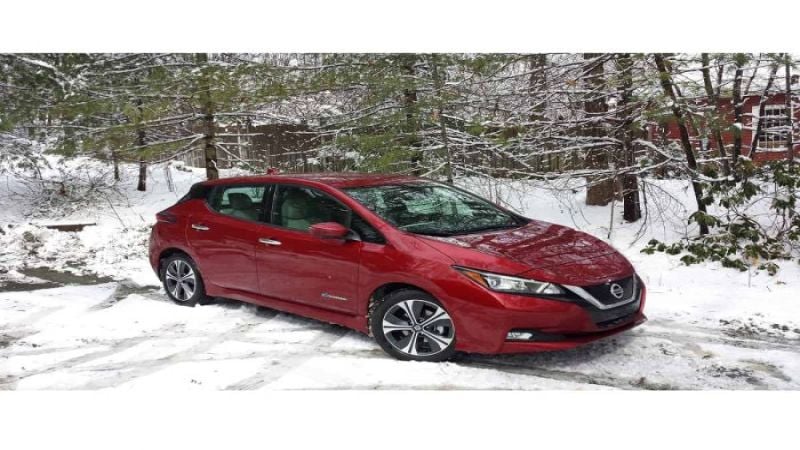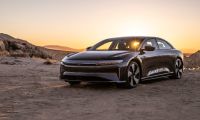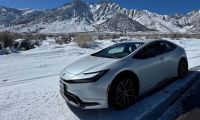We had the chance to test the 2018 Nissan Leaf this week in winter weather and found that it is just as capable in snow, ice and cold as any other front-wheel drive vehicle. It may seem silly to even ask if an electric vehicle can tackle winter, but even GM's CEO, Mary Barra, a true advocate of EVs, seems to think that they aren't up to the task. If you have any doubts, check out the last few minutes of the video below.
Front-wheel drive cars are nobody's choice for the best winter vehicles. Let's face it, the all-wheel-drive crossover with a bit more ground clearance is superior in every measurable way. However, budgets, preference and practicality sometimes dictate that a family, person, or couple have just one compact car. In these circumstances, we would recommend an EV to anyone for whom the EV range and charging situation works. That isn't everybody, but as range increases more and more people can say yes to electrics.
Our 2018 Nissan Leaf SL tester rang in at just over $38K. Consider $10K in incentives and the fully-loaded leaf with premium leather heated seats and heated steering wheel is as good as any gasoline-powered FWD compact we have tested in snow. In fact, since the heater does not require that the engine be warm, the car was more quickly comfortable on cold mornings. Plus, plan ahead and you can pre-condition the cabin.
The Leaf uses "normal" tires as well. They are the same size and shape as most ICE vehicle tires and worked great on winter-rutted roads. We found the car handled as expected in snow.
Those who want an affordable green car with true winter chops can find it in the AWD Toyota RAV4 Hybrid, or Highlander Hybrid. Those with no budget limitations can find two premium electric choices with AWD at Tesla showrooms.
The method of propulsion has no impact on a vehicle's performance in winter and automakers have abundant choices now for those who want to drive green, but be able to deal with the worst winter has to offer.
Set Torque News as Preferred Source on Google












Comments
How good are the batteries in
Permalink
How good are the batteries in 30 below zero(f) when one has a lot of icy roads to deal with - and no inside storage/parking available?
What do you do when the power is out for 1- days in these conditions?
I live in Winnipeg, Canada
Permalink
In reply to How good are the batteries in by Mahonri (not verified)
I live in Winnipeg, Canada where we have -20C or colder for an average of 50 days a year. I have driven my leaf many days in -30C. When the temperature is -30C, I get 50% of my advertised range which is 120km on a charge. Since I average between 35-70kms a day, this is no problem. The vehicle handles better than any of my ICE vehicles in winter. It warms up better and due to the heavy battery under the car, it has better traction than my Honda FIT. I park my vehicle in an unheated garage. If you parked it outside at -30C but kept it plugged in to a 110V plug all night, it would be fine. If you could not plug it in, and had consecutive days of -30C highs, the battery could get too cold. If the power was out, you would have to drive it somewhere to be charged. In the 45 years I have lived in Winnipeg, the entire city has never been without power ever. If you live in a place where that happens frequently, I would say an EV is not a good choice for you as it does require electricity to drive. I hope this answers your questions.